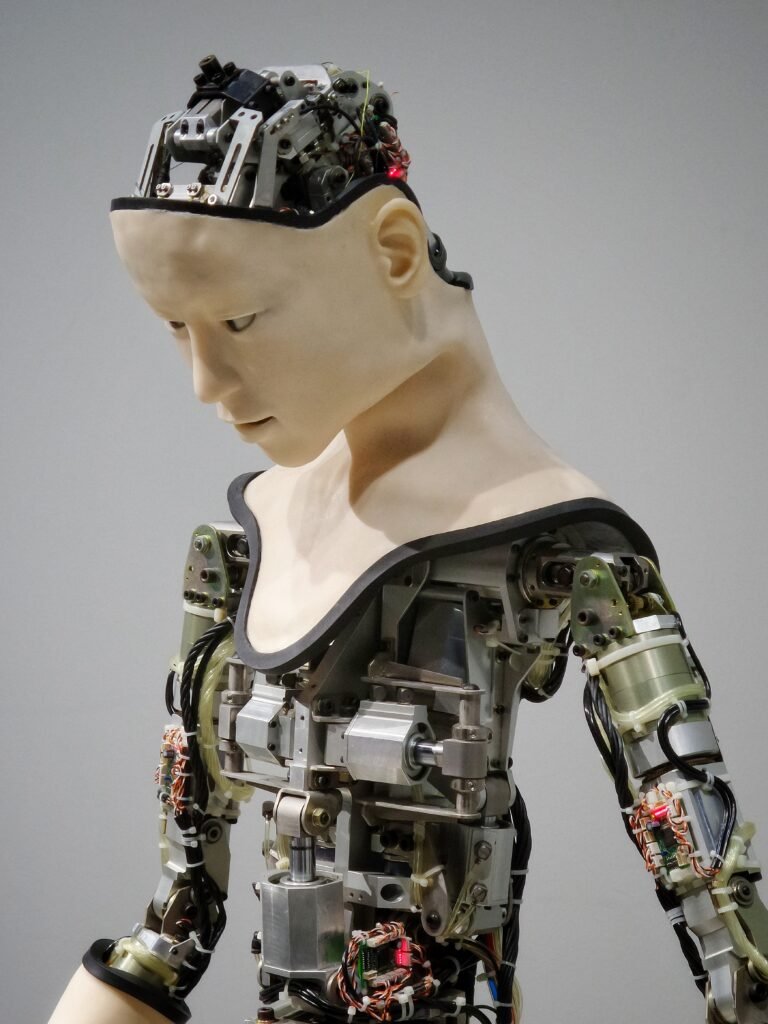Artificial Intelligence (AI) has become an integral part of our lives, revolutionizing numerous industries and enhancing our daily experiences. From virtual voice assistants to self-driving cars, AI continues to push boundaries and shape the future. However, as this technology advances at an unprecedented pace, questions arise about the need for regulation. Should we impose limits on AI to ensure ethical use and safeguard against potential dangers? This article explores the delicate balance between embracing the potential of AI and implementing regulations to protect humanity from any unforeseen implications.

Benefits of Artificial Intelligence
Improving efficiency and productivity
Artificial Intelligence (AI) has the potential to significantly improve efficiency and productivity across various industries. By automating repetitive tasks and streamlining processes, AI technologies can save time and reduce human error. For example, in manufacturing, AI-powered robots can perform tasks with greater precision and speed, leading to higher production output. This enhanced efficiency allows businesses to allocate resources more effectively and focus on higher-value activities.
Enhancing decision-making
AI systems can analyze vast amounts of data and extract valuable insights, enabling better decision-making. From healthcare to finance, AI algorithms can quickly process complex information, identify patterns, and provide recommendations. This can assist doctors in diagnosing diseases, aid financial institutions in assessing creditworthiness, and support businesses in predicting consumer behavior. By leveraging AI’s ability to identify relevant data and generate actionable insights, decision-makers can make more informed choices.
Automation of repetitive tasks
One of the significant advantages of AI is its ability to automate repetitive tasks. By offloading monotonous and time-consuming work to AI systems, organizations can free up human resources to focus on more creative and strategic endeavors. This automation not only increases efficiency but also reduces the risk of human error. From customer service chatbots to automated data analysis, AI-driven automation has the potential to revolutionize various aspects of work and enable professionals to tackle more complex and value-added activities.
Challenges of Artificial Intelligence
Ethical concerns
As AI becomes more advanced, ethical concerns arise regarding its impact on society. For example, facial recognition technology can be used for surveillance purposes, raising questions about privacy and personal freedoms. Similarly, AI algorithms can inadvertently perpetuate biases and discrimination, affecting hiring processes and resource allocation. Addressing these ethical concerns is crucial to ensure AI benefits all individuals and does not exacerbate social inequalities or violate personal rights.
Privacy and data security
The vast amount of data required for AI algorithms to function can pose significant privacy and security challenges. Collecting and analyzing personal data can potentially invade individuals’ privacy if not handled appropriately. Additionally, the potential for data breaches and misuse of sensitive information raises concerns about the security of AI systems. Regulations must address these issues by establishing robust data protection practices, ensuring transparency in data usage, and protecting individuals from unauthorized access or malicious intent.
Job displacement
While the automation of tasks can improve efficiency, it also raises concerns about job displacement. As AI technologies advance, there is a fear that many jobs will become obsolete, particularly in industries heavily reliant on repetitive or rule-based tasks. This requires careful consideration of how to retrain and upskill the workforce to adapt to the evolving job market. Moreover, regulations should focus on fostering a balance between AI-driven automation and job creation to ensure a smooth transition for workers.
Argument for Regulation
Ethical implications
Given the potential impact of AI on society, regulation is necessary to address the ethical implications. Clear guidelines can help mitigate risks associated with bias, discrimination, and privacy infringements. By establishing ethical standards, such as algorithmic transparency and fairness, regulations can ensure that AI technologies align with societal values, uphold human rights, and promote inclusivity.
Preventing misuse and abuse
Regulation is essential to prevent the misuse and abuse of AI technologies. Without proper oversight, AI could be weaponized, leading to cyber attacks, misinformation campaigns, or other malicious activities. By setting rules and limitations, regulators can enforce responsible use of AI and protect individuals and societies from potential harm.
Ensuring transparency and accountability
Regulation is crucial for ensuring transparency and accountability in the development and deployment of AI systems. By requiring clear documentation and explanations of AI algorithms, regulators can promote trust and understanding among users. Additionally, accountability mechanisms can be established to hold developers and companies responsible for any negative impacts or violations of regulations. This fosters a culture of responsibility and encourages ethical behavior in the AI industry.
Argument against Regulation
Innovation and development
A key argument against excessive regulation is the potential hindrance to innovation and development of AI technologies. Stringent regulations may impose significant compliance burdens on businesses, limiting their ability to experiment and iterate on AI solutions. Flexibility in regulation can foster innovation by allowing developers to adapt and refine their technologies without excessive bureaucratic hurdles.
Avoiding stifling progress
Overregulation runs the risk of stifling progress in AI development. Rapid advancements and breakthroughs in AI technologies require an environment that encourages experimentation and risk-taking. If regulations become overly restrictive, developers may be discouraged from pursuing ambitious projects, potentially impeding the pace of innovation and depriving society of potential benefits.
Market competition
Excessive regulation can also impact market competition by favoring incumbents with the resources to comply with regulatory requirements. This could create barriers to entry for smaller startups or companies that lack the financial means to navigate complex regulatory landscapes. Balancing regulation with competition policies is necessary to ensure a level playing field and encourage a dynamic and diverse AI market.

Balancing Regulation and Innovation
Developing ethical guidelines
To strike a balance between regulation and innovation, the development of ethical guidelines is vital. These guidelines can provide a framework for the responsible and ethical deployment of AI technologies. They should address issues such as transparency, fairness, and accountability while allowing enough flexibility to accommodate innovation and development.
Collaboration between regulators and developers
Regulators and developers should collaborate closely to ensure that regulations are practical, effective, and adaptable. Engaging developers in the regulatory process allows for a better understanding of technological capabilities and limitations. It also helps regulators stay informed about emerging AI trends and challenges, enabling them to craft informed regulations.
Testing and evaluation frameworks
The establishment of testing and evaluation frameworks is crucial in balancing regulation and innovation. Such frameworks can help identify potential risks, assess the performance of AI systems, and ensure compliance with ethical guidelines. Regular assessments can also provide insights into the impact of AI technologies on various stakeholders, facilitating the refinement of regulations and encouraging continuous improvement.
Regulating AI in Specific Industries
Healthcare
Regulating AI in healthcare is critical to ensure patient safety, privacy, and ethical use of technology. Regulations should address issues related to the accuracy and validity of AI-driven diagnosis and treatment recommendations. Ethical considerations such as informed consent and the responsible sharing and management of patient data are also essential in healthcare AI regulation.
Finance
Regulating AI in the finance industry focuses on addressing potential risks associated with algorithmic trading, credit scoring, and fraud detection. Regulations should ensure transparency and accountability of AI systems used for financial decision-making. Additionally, protecting customer data and ensuring secure transactions are critical aspects of AI regulation in finance.
Transportation
With the rise of autonomous vehicles and smart transportation systems, regulating AI in the transportation sector is crucial for ensuring public safety and optimizing transportation networks. Regulations should cover aspects including safety standards, cybersecurity measures, and ethical considerations related to data collection and privacy.

International Efforts in AI Regulation
EU General Data Protection Regulation
The European Union’s General Data Protection Regulation (GDPR) addresses personal data protection and privacy rights. Although not specific to AI, GDPR has implications for AI systems handling personal data. It establishes rules and requirements for the lawful processing of personal data, providing individuals with control over their data. Compliance with GDPR is crucial for businesses operating in the EU and serves as a model for AI regulation worldwide.
United Nations Guidelines for Artificial Intelligence
The United Nations (UN) is actively engaged in discussions on AI regulation and has developed guidelines for ethical AI. These guidelines emphasize principles such as transparency, fairness, and accountability. They encourage member states to adopt policies that promote AI for the benefit of all, ensuring its development aligns with human rights, sustainable development, and societal well-being.
Current Approaches to AI Regulation
Transparency and explainability requirements
Regulations that require transparency and explainability of AI systems aim to address concerns regarding biases, discrimination, and accountability. By making AI processes and decision-making more understandable, transparency requirements ensure that users can better trust and assess the outputs of AI systems. This promotes accountability and enables individuals to identify and resolve biases or discriminatory behaviors.
Data protection and privacy regulations
Data protection and privacy regulations are crucial in an AI-driven world where massive amounts of personal data are processed. These regulations ensure that individuals’ privacy rights are respected and that their personal information is handled securely. Laws such as the GDPR in Europe and the California Consumer Privacy Act (CCPA) in the United States provide frameworks for protecting data and giving individuals more control over their personal information.
Industry self-regulation
Industry self-regulation is an approach where companies voluntarily adopt ethical guidelines and best practices for AI development and deployment. This approach allows companies to shape their own regulations and standards, emphasizing their commitment to responsible AI use. While self-regulation can be a positive step towards ethical AI, it also requires independent validation and monitoring to ensure compliance and accountability.
Concerns with Existing Regulation
Lack of standardization
One concern with existing AI regulation is the lack of standardization across different countries and industries. Varying regulations and legal frameworks can create challenges for businesses operating globally or across different sectors. Standardizing AI regulation would help create a more consistent and harmonized approach, facilitating innovation, and enabling better international collaboration.
Limited enforcement capabilities
Another concern is the limited enforcement capabilities of existing AI regulations. Insufficient resources, technological expertise, and international coordination can hamper effective enforcement. To ensure compliance with regulations, governments need to allocate adequate resources, establish specialized enforcement bodies, and foster international collaboration to address the cross-border challenges of AI regulation.
Technological advancements outpacing regulations
The rapid progress of AI technologies often outpaces the development of regulations. This creates a gap where emerging technologies may not be adequately addressed or regulated, leaving potential risks unaddressed. Effective AI regulation requires an iterative approach, staying updated with technological advancements and consistently adapting regulations to mitigate emerging risks.
Future Perspectives on AI Regulation
International collaboration and harmonization
The future of AI regulation lies in international collaboration and harmonization efforts. Given the global and cross-border nature of AI, cohesive and coordinated regulation is necessary to address challenges effectively. By sharing best practices, collaborating on standards, and aligning regulatory frameworks, countries can create a globally consistent approach that facilitates innovation while protecting individuals and society.
Adapting regulation to emerging AI technologies
As AI continues to evolve, regulations must adapt to address emerging technologies and applications. Initiatives such as regulatory sandboxes, which allow for controlled testing of new AI applications, can support innovation while ensuring compliance with ethical standards. Flexible and agile regulatory approaches that take into account both new risks and opportunities are essential to foster responsible AI development.
Societal and ethical impact assessments
Integrating societal and ethical impact assessments into AI regulation can help anticipate and address potential risks and consequences. By conducting comprehensive assessments of AI systems’ impact on individuals, communities, and society as a whole, regulators can proactively address ethical concerns and ensure AI technologies align with societal values. These assessments can guide the development of regulations and provide a foundation for responsible AI deployment.
In conclusion, the regulation of artificial intelligence is necessary to maximize its benefits while mitigating potential risks. Striking the right balance between regulation and innovation requires careful consideration of ethical implications, collaboration between regulators and developers, and the development of adaptive frameworks. By implementing robust regulations that promote transparency, fairness, and accountability, society can harness the transformative power of AI while safeguarding individuals’ rights and privacy. International efforts, emerging regulatory approaches, and future perspectives will shape the regulatory landscape, ensuring responsible and ethical AI development.






